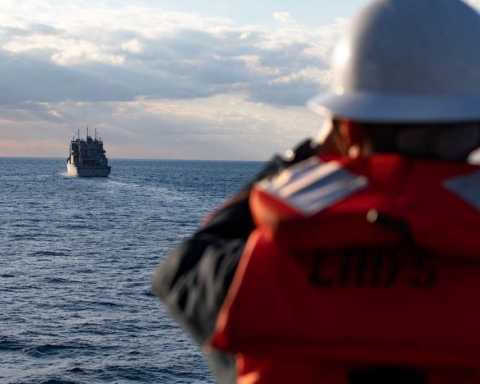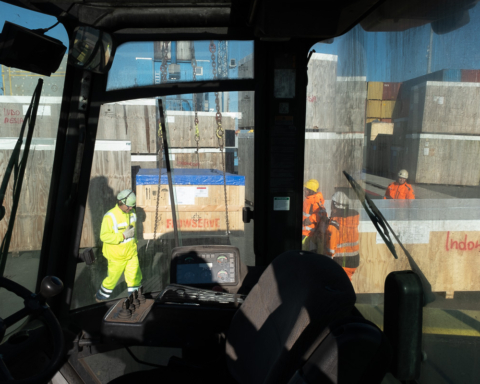Tough times lie ahead for ports. The increasing industrial action in response to rising inflation-at Felixstowe and Liverpool, England, as well as in Germany-is putting pressure on supply chains, already under strain during the pandemic.
While analysts fear that many national economies, particularly Germany’s, will deteriorate into a recession due to a high inflation and low growth scenario, difficulties in the logistics chain, pressures from the war in Ukraine, particularly in the energy sector, and strikes in British and Old Continent ports are likely to add new fuel to the fire.
According to Christian Roeloffs, CEO and co-founder of Container xChange, even the smallest disruptions in port operations can have a major impact on the efficiency of the container line network and cause a domino effect up and down supply chains.
The best-known strike, the one at the Port of Felixstowe, which began on August 21st, involves as many as 1,900 workers. Eight days of quay picketing and operational blockades are planned as a response to the failure to reach an agreement with employers on bringing wages up to the current rate of inflation.
Shipping companies quickly ran for cover, cutting the UK’s most important gateway port from their scheduled services or re-directing containers to alternative ports, either in the UK or in Northern Europe
According to Container XChange, the strike will add new challenges to those that the Port of Felixstowe, and the entire British economy, are already facing.
In fact, over the past two years, the British port of call has already suffered from the well-known congestion problems that have put the operational resilience of many other ports (first and foremost, the American ports of Los Angeles and Long Beach) under strain.
According to Container xChange’s Container Availability Index (CAx), Felixstowe’s average CAx reading for most of 2022 was about 0.9, one of the highest in Europe. A CAx reading above 0.5 indicates a surplus of containers while a figure below 0.5 indicates a shortage.
“Felixstowe Container Availability Index suggests that terminal operators and carriers likely had difficulty clearing container storage areas, particularly empty containers, even before the strike began,” Roeloffs explains, pointing out that these disruptions to the supply chain are likely to have a negative impact on intra-European and Asia-Europe shipping services.
Dockers at the Port of Liverpool have also voted to strike, in view of getting better pay conditions, although union representatives have not yet confirmed when the protests will take place.
In Vespucci Maritime CEO Lars Jensen’s opinion, if these strikes continue, there are likely to be spinoff effects on the European continent as well. He stressed that with such large strikes, carriers would probably have to unload goods bound for the UK at major hubs, such as Antwerp and Rotterdam, with the immediate effect of further worsening the existing congestion problems on the Continent, which had already being getting worse due to the numerous labor disputes in German ports over the summer.
At present, in fact, no agreement has yet been reached between the Ver.di union and the Central Association of German Ship Operators (ZDS). Negotiations are currently underway. The union is negotiating for the approximately 12,000 workers in the 58 companies located in major ports, including Hamburg, Bremerhaven and Wilhelmshaven.
Container XChange points out how, among the immediate consequences of these protests was the buildup of containers in terminals and storage depots, which led to new operational inefficiencies, putting the entire European distribution chain under stress.
This adds to the far more worrisome water-shortage problem, which has hit Europe over the last few months, with the Rhine currently at a record minimum level since the beginning of the Century, causing, severe disruptions to the transportation of goods and the supply of drinking water.
The combined strike-water shortage impact has been devasting. The port of Bremerhaven, for example, saw its CAx rise from below 0.6 in June to above 0.8 in the aftermath of the strikes. And it has remained above 0.7 since mid-July. The port of Hamburg has also recorded similar CAx readings of over 0.8 since the summer strike.
We don’t know how much longer the intolerable situation fueled by the high cost of living and the energy issue will continue. What is certain is that the strikes will make it more difficult to solve persisting tensions over container logistics.
Enrico Tortolano, coordinator for the International Transport Workers’ Federation’s port workers division said it had to be clear that the workers were not to blame. He stressed that the dockworkers didn’t want to go on strike; they would much rather have been working. Unfortunately, he added, managers continue to be inflexible in the face of what is happening out there in the real world
The ITF condemns what it calls “the incredible corporate greed in the wake of a crisis that affects us all.”
According to the organization’s president, Paddy Crumlin, some CEOs have seized every opportunity to make a quick profit without thinking about the long-term consequences. They are not building sustainable businesses and making the increasingly widening gap between rich and poor in this world obvious to workers. “A summer of discontent is the least they should expect,” he said
Translation by Giles Foster




